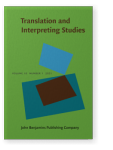Radical cultural specificity in translation
Most existing discussions of cultural specificity in translation presume that although translation may be
difficult, the meaning of culturally-specific terms is at least known. This article considers the possibility of “radical cultural
specificity,” in which the meaning of the item is inaccessible to the reader or translator and no native participant in the source
culture is available to advise. Based on the concepts of culturally-specific items from the work of Javier Aixelá and radical
translation from the work of W.V.O. Quine, I develop the notion of radical cultural specificity using examples from medieval
Celtic literature, highlighting the role of knowledge and lack of knowledge in interpretation and translation. The concept is then
briefly applied to science fiction or speculative fiction as well, suggesting that these concerns are not merely the province of
scholars of historical literature.
Article outline
- Introduction
- What we know, and what we don’t know
- On radical specificity and untranslatability
- What we partly know
- On strategies
- What we invent
- On strange beasts
- Acknowledgments
- Notes
-
References
References (38)
Aixelá, Javier Franco
1996 “
Culture-specific items in translation.” In
Translation, Power, Subversion, ed. by
Román Álvarez and
M. Carmen-África Vidal, 52–78. Clevedon: Multilingual Matters.

Badke, David
2011 The Medieval Bestiary.
[URL]. Last accessed 18 March 2020.
Beebee, Thomas
2012 Transmesis: Inside Translation’s Black Box. New York: Palgrave Macmillan.


Birnie, John
1838 Account of the Families of Birnie and Hamilton of Broomhill, ed. by
William B. Turnbull. Edinburgh: Printed for Private Distribution.

Boyd, Matthieu
2016 “
On not eating dog.” In
Ollam: Studies in Gaelic and Related Traditions in Honor of Tomás Ó Cathasaigh, ed. by
Matthieu Boyd, 35–46. Madison, NJ: Fairleigh Dickinson University Press.

Brambilla, Marco
(dir.) 1993 Demolition Man.
Warner Brothers. DVD. Distrib. Warner Home Video Española. Region 2. Release date 1 December 2006.

Bromwich, Rachel
(ed. and trans.) 2014 Trioedd ynys Prydein: The Triads of the Island of Britain. 4th edition. Cardiff: University of Wales Press.

Cassin, Barbara
(ed.) 2014 Dictionary of Untranslatables. trans. by
Stephen Rendall,
et al., ed. by
Emily Apter,
Jacques Lezra, and
Michael Wood. Princeton: Princeton University Press.


Davis, Craig
2005 “
The earliest Arthurian poems in Welsh.”
Metamorphosis 13(2): 128–141.

Dictionary of the Scots Language
n.d.
[URL]. Last accessed 18 March 2020.
Electronic dictionary of the Irish language
n.d.
[URL]. Last accessed 18 March 2020.
Hammond, Dick
1999 Haunted waters: Tales of the Old Coast. Madeira Park, BC: Harbour.

Haycock, Marged
(ed. and trans.) 2007 Legendary Poems from the Book of Taliesin. Aberystwyth: CMCS Publications.

Henry, P. L.
1982 “
Furor heroicus.”
Zeitschrift für celtische Philologie 391: 235–242.


Holmes, James S.
1994a “
The cross-temporal factor in verse translation.” In
Translated! Papers on Literary Translation and Translation Studies, 35–44. 2nd ed. Amsterdam: Rodopi.

Holmes, James S.
1994b “
Rebuilding the bridge at Bommel: Notes on the limits of translatability.” In
Translated! Papers on Literary Translation and Translation Studies, 45–52. 2nd. ed. Amsterdam: Rodopi.

Kinsella, Thomas
(trans) 1969 The Táin. Oxford: Oxford University Press.

Leslie, Jhone
1888 The Historie of Scotland: Wrytten First in Latin by the Most Reuerend and Worthy Jhone Leslie... and Translated in Scottish by Father James Dalrymple... in... 1596. Vol I1. Edinburgh: William Blackwood & Sons.

Loomis, Roger Sherman
1941 “
The Spoils of Annwn: An early Arthurian poem.”
PMLA 56(4): 887–936.


Mannheim, Bruce
2015 “
All translation is radical translation.” In
Translating Worlds: The Epistemological Space of Translation, ed. by
William F. Hanks and
Carlo Severi, 199–219. Chicago: Hau Books.

Meyer, Kuno
(trans.) 1888 “
The wooing of Emer.”
Archaeological Review 1(1–4): 68–75, 150–155, 231–235, 298–307.

Meyer, Kuno
(ed. and trans.) 1890 “
The Oldest version of Tochmarc Emire
.”
Revue celtique 111: 433–57.

Meyer, Kuno
(ed. and trans.) 1904 “
Death of Conla.”
Ériu 11: 113–121.
[URL]
Moore, Elizabeth
2009 “
‘In t-indellchró bodba fer talman’: A Reading of Cú Chulainn’s first recension ‘ríastrad.’”
Proceedings of the Harvard Celtic Colloquium 291: 154–176.
[URL]
Mossop, Brian
1996 “
The image of translation in science fiction & astronomy.”
The Translator 2(1): 1–26.


O’Rahilly, Cecile
(ed. and trans.) 1967 Táin Bó Cúailnge from the Book of Leinster. Dublin: Dublin Institute for Advanced Studies.

Quine, W. V. O.
1959 “
Meaning and translation.” In
On Translation, ed. by
Reuben Brower. Cambridge, MA: Harvard University Press. 148–172.


Quine, W. V. O.
1960 Word and Object. Cambridge, MA: The Technology Press of the Massachusetts Institute of Technology.

Shakespeare, William
1997 Antony and Cleopatra. New York: W.W. Norton.

Strachan, John and J. G. O’Keeffe
(eds) 1912 The Táin Bó Cúailnge from the Yellow Book of Lecan. Dublin and London: Royal Irish Academy.

Tymockzo, Maria
1999 Translation in a Postcolonial Context. London: Routledge.

Van Hamel, A. G.
(ed.) 1978 Compert Con Culainn. Dublin: Dublin Institute for Advanced Studies.

van Zanten, Arwen
2007 “
Going berserk: In Old Norse, Old Irish and Anglo-Saxon literature.”
Amsterdamer Beiträge zur älteren Germanistik 631: 43–64.


Venuti, Lawrence
1992 Rethinking Translation: Discourse, Subjectivity, Ideology. London: Routledge.

Venuti, Lawrence
1995 The Translator’s Invisibility. London: Routledge.


Washbourne, Kelly
2015 “
The outer limits of otherness: Ideologies of human translation in speculative fiction.”
Translation Studies 8(3): 284–301.


Windisch, Ernst
(ed.) 1880 Irische Texte mit Wörterbuch. Leipzig: Hirzel.

Wright, Crispin
2017 “
Indeterminacy of translation.” In
A Companion to the Philosophy of Language, 2nd ed., ed. by
Bob Hale,
Crispin Wright, and
Alexander Miller. Wiley Online Library.


Cited by (1)
Cited by 1 other publications
Tudela, Elisa Sampson Vera
2022.
Daniel Alarcón’sLost City Radioand the work of translation.
Journal of Romance Studies 22:2
► pp. 217 ff.

This list is based on CrossRef data as of 5 july 2024. Please note that it may not be complete. Sources presented here have been supplied by the respective publishers.
Any errors therein should be reported to them.
